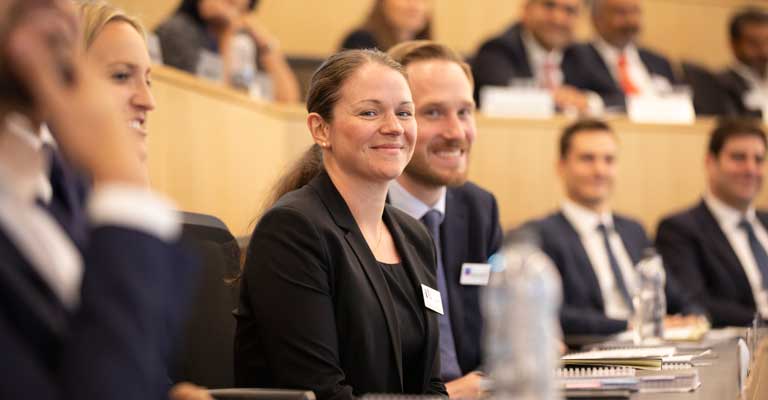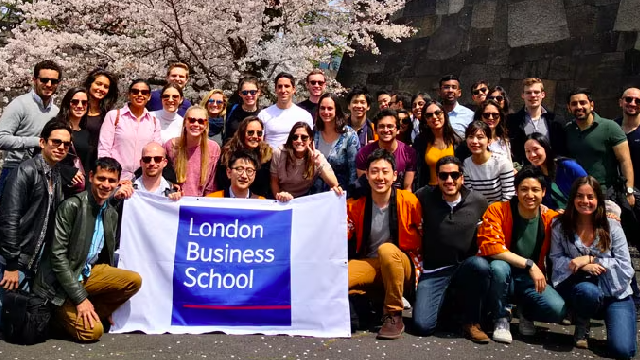The Executive MBA
Didn't find what you were looking for? Visit the programme's overview page:

- Why should I choose an Executive MBA?
The EMBA may be for you if you want to complete an MBA without interrupting your career. As an EMBA participant you remain in full-time work while you study, simultaneously advancing your career and your professional and personal development.
EMBA students are able to immediately apply knowledge gained through the programme back in the workplace, which fast-tracks your learning process. The London Business School Executive MBA is an intensive, challenging, highly stimulating and enriching experience.
- What's the difference between the full-time MBA and the Executive MBA?
While both the MBA and the Executive MBA cover similar material, and both award the same MBA degree, there are some fundamental differences.
Executive MBA (Dubai) conducts its core courses in five-day modules each month in Dubai, with some visits to London.
Full-time MBA students take part in a number of practical exercises, such as work shadowing and placements, making it more suitable for those at an earlier stage in their career.
- What's the difference between the London and Dubai streams of the Executive MBA?
Executive MBA (London) conducts its core courses on consecutive Fridays and Saturdays of alternate weeks in London.
Executive MBA (Dubai) conducts the majority of its core courses in four or five-day modules each month in Dubai, with some visits to London.
All Executive MBA students have access to London Business School's extensive elective portfolio and international elective options, but only Executive MBA (Dubai) students take core courses in both Dubai and London.
For Executive MBA (London) students, core course teaching is conducted in London only.
We offer a fully aligned curriculum and admission requirements across both streams, so your choice of primary study location is dependent upon your personal preference and circumstances.
- Is it possible to do the Executive MBA if I don't live in either London or Dubai?
There are no admissions restrictions in terms of geographic location.
However, as the majority of the Executive MBA programme is delivered in London or Dubai, please think carefully about how you can combine the travel requirements with your full-time employment.
Approximately 30% of Executive MBA students live outside the UK and the UAE, and commute to London and/or Dubai for classes. Commuting can be demanding, but the benefits from the programme far outweigh the inconvenience of travel.
- Can I swap between the London and Dubai streams of the Executive MBA?
No. You must apply and commit to only one stream of the programme. This decision determines the primary location(s) of your core coursework.
After you have completed the core, you are free to customise your programme experience by choosing electives from the School's elective portfolios.
- How can I convince my employer to support me through the Executive MBA?
The Executive MBA provides immediate benefits to sponsoring organisations. Students can immediately apply the theory learned in the classroom to their job and are able to tailor elective aspects of the programme to the specific knowledge requirements of their business.
Sponsoring organisations also become part of the wide and diverse London Business School network and can attend an annual Employers' Event.
- How do I find out more about the EMBA programme?
Once you have explored the EMBA web pages and reviewed the brochure, one of the best ways to learn more about the Executive MBA is to attend one of our online information sessions or an in-person Experience Evening at our campus in Dubai International Financial Centre.
Any other questions? Email us at emba@london.edu.
- How can I find out more about the EMBA programme if I'm not based in the UK?
You can attend one of our virtual information events. To find out more, see the information events page.
We can have a telephone conversation with you. Depending on your location, you can either call our London campus on +44 (0)20 7000 7512, or our Dubai centre on +971 440 193 01. Either call us at a convenient time for you, or email us at emba@london.edu with the number you would like us to call you on. We will be in touch to answer your questions about the programme and London Business School.
If you would like to speak directly with students or alumni, send your CV to emba@london.edu, so that we can match you with a suitable contact. You can also email us at emba@london.edu with any questions about the Executive MBA programme or London Business School.
- Are there any employment restrictions I should be aware of?
Before joining the EMBA, you are expected to be employed as the programme is designed for working professionals. However, exceptions may apply, on a case-by-case basis. Please reach out to the Recruitment team to discuss your situation.
Programme content and learning experience
Didn't find what you were looking for? Visit our pages:

- How is the curriculum structured for the Executive MBA?
The Executive MBA is a five-term, 20-month programme. Students on both the London and Dubai streams come together in London to start the Executive MBA experience. All shared modules are residential and provide the ideal environment in which to build valuable networks with an extended group of diverse peers.
Following orientation week in London, you will continue your programme in either London or Dubai and study the majority of core courses in your primary study location. In London, core courses are taught on consecutive Fridays and Saturdays of alternate weeks. In Dubai, core courses are taught in a five-day block each month.
In Year 2, you take between six and nine elective courses. Schedules differ depending on which electives you choose. Students may take part in a Global experiential course. You can also elect to undertake an in-company project as part of your elective credits.
The Executive MBA concludes with the London and Dubai streams coming together for two further residential modules. These modules consolidate your learning through multi-disciplinary group simulation and feedback, to help you prepare for your career transitions ahead.
There are also optional workshops offered throughout the programme that are designed to develop your interpersonal skills, and cover topics such as presenting, negotiating, handling conflict and business writing.
Listen to our podcast to hear more on the Faculty and the EMBA classroom experience.
- What are the study groups and how are they put together?
Study groups consist of about five or six people who work together for core course work during the first three terms. When putting the study groups together, we look for a balance of educational background, work background, gender and nationality.
- Can I waive core courses if I've already studied a particular subject?
If you hold professional accounting qualifications, you may request to opt out of the accounting core courses. Waivers are judged on a case-by-case basis.
- How do electives fit in the programme structure?
Elective courses offer you the opportunity to concentrate on areas of special interest and to explore new subjects. Studied in the last two terms, Executive MBA students complete between six and nine elective courses, each taught over 30 classroom hours.
- Where do I take my electives?
The broadest choice of electives is available in London, with a selection of the most popular courses offered in Dubai. A limited number of elective opportunities are also available in New York through our partnership agreement with Columbia Business School.
- What format are the electives offered in?
London Business School electives are offered in a variety of formats e.g. block weeks, once a week over ten weeks, alternating weeks, Fridays/Saturdays etc. Please note that not all electives are offered in all formats.
- Where does the teaching take place?
Face-to-face compulsory teaching takes place on campus in London bi-weekly.
- How much time do I need to allocate to each elective?
Time spent in preparation outside of class will vary according to the course chosen and your background in the subject matter. On average, you can expect to spend approximately 10-20 hours in preparation outside of class for each course undertaken.
- What is the in-company project?
You may elect to undertake an in-company project as part of your elective credits. The project focuses on a business issue of particular relevance to you and/or your organisation. Supervised by a faculty member, you integrate theory and practice, and apply the knowledge and tools introduced on the programme to real business challenges. It is your opportunity to provide a substantial and tangible benefit to your organisation as you apply the latest trends and research in management thinking.
- How many days will I need to take out of the office to complete the Executive MBA?
Your choice of study location and elective options will dictate your schedule and therefore the number of days you are required to take out of the office. However, in the first three terms, when studying the core courses and the international assignment, your schedule is set.
- Executive MBA (London) students will need to attend London Business School for approximately 51 days, 28 days of which are weekdays.
- Executive MBA (Dubai) students will be required to attend classes in Dubai and London for approximately 57 days, of which 46 days are weekdays if you reside in the UAE. If you reside in a GCC country other than the UAE, 36 days out of approximately 57 days are weekdays.
Please note that this does not include any travel time you may need to attend the programme.
In the last two terms you undertake electives, and your schedule will vary depending upon which courses you choose and in which format these courses are offered.
- How much time will I need to spend studying outside the classroom?
The time spent studying outside the classroom varies from student to student. However, most students estimate they spend an average of 20 hours studying each week in addition to time spent in class. You will get more out of the programme the more you put in, so the more time committed outside classroom hours leads to greater gains in learning outcomes.
- Who has responsibility for the EMBA programme experience?
- What does it take to graduate from the EMBA programme?
For further detail on current course credits and graduation requirements, please contact a member of the Recruitment and Admissions team for the most up to date information.
- Which faculty teach on the EMBA London and Dubai programmes?
Some of our most experienced faculty teach across the EMBA programme, although the list changes from year to year.
- Which organisations accredit the EMBA London and Dubai programmes?
Class profile and career impact
Didn't find what you were looking for? Visit our pages:

- What is the typical Executive MBA student like?
What is the typical Executive MBA student like?
Here is the profile of a typical Executive MBA class*:
Executive MBA (London)
- Typical class size: 80
- Average work experience: 12 years
- Range of work experience: 6-26 years
- Women: 26%
- Nationalities represented: 34
Executive MBA (Dubai)
- Typical class size: 55
- Average work experience: 12 years
- Range of work experience: 5-24 years
- Women: 23%
- Nationalities represented: 27
*These figures are a three year average and represent a typical EMBA class. Please note that admission decisions are taken in accordance with best equal opportunities.
To hear more on the Executive MBA's history and the typical class profile, listen to our podcast.
- What level of work experience do I need?
You need to be able to demonstrate experience in the management of projects, budgets, processes or people over a sustained period. Students typically have between six and 22 years of managerial experience.
- How does the LBS Career Centre work with EMBA students?
Career Centre provides support in four ways:
- Career development – you will develop the skills necessary to manage your individual career strategy, whether that is conducting an effective job search, accelerating in your organisation or setting up your own entrepreneurial venture
- Career coaching – one-to-one tailored support to give you a better understanding of who you are, what you have to offer and what is right for you
- Career and networking opportunities – you will have the opportunity to explore and examine different sectors, companies and roles through meeting practitioners and professionals
- Career insights – you will build on your own research by accessing up to date information on employment trends and hiring practices, as well as geographic, sector and company insights.
- If my company is sponsoring me can I still work with the Career Centre?
All EMBA students have access to all that the Career Centre has to offer. Most of the workshops and resources apply whether you are looking for new roles or wishing to enhance your progress within your own organisation. For students wanting to move onwards and upwards in their own organisation, our career acceleration tools and techniques are particularly relevant.
Each year, Career Centre invite all EMBA students to bring their supporting employers to a summer breakfast as a thank you for their support, whether this is financial or otherwise. They will get to network with each other and experience a thought-provoking talk from one of our world-class faculty.
- What is unique about the EMBA career provision?
Students choosing to enrol onto the LBS EMBA are experienced executives reaching the peak of their career, each with a unique profile.
Working with a dedicated Career Lead, students can plan their individual career strategy. Some will hope to change their career path; others will want to move industry; some may experiment with entrepreneurship, while some will leverage the programme learning to accelerate their career within their current organisation.
At executive level we understand that you are in the leagues of being the ‘expert’, and that hiring works differently at this senior level. For this reason, the emphasis is not on recruitment, but rather on empowering you to plan your own individual career progression strategy, working with you to craft your personal story and target organisations where you could add value.
- How should I think about recruitment?
When companies recruit at executive level, they usually seek a specific profile of experience, personality and fit for their organisation. Only a handful of candidates will meet their criteria and they will not use structured business school recruitment as a means to find them (as is typical for MBA hiring). For senior positions, recruiters do not limit their search to business schools.
Career Centre focuses attention on helping individual students develop a strong personal brand, effective self-marketing tools, and a clear job search strategy to enable them to secure conversations with organisations who will value their particular profile.
- How should I think about my career strategy?
Your career goals are unique and you are in the driving seat when it comes to planning your career journey. Whether your aim is to accelerate your career within your existing organisation, by identifying fresh or global responsibilities, make an external career transition, or pursue an entrepreneurial venture, the Executive MBA can equip you with the knowledge and networking opportunities to take ownership of your career with confidence.
- Does career support continue after I graduate?
As a member of our alumni community we hope that you continue to engage with us for your career development needs.
We run an annual programme of webinars, events and workshops to support you in your career and professional development. These cover a range of topics, from developing your personal brand to becoming a Non-Executive Director.
We provide access to a range of resources and also offer alumni the opportunity to work with a career coach.
Admissions and application process
Didn't find what you were looking for? Visit our page:

- Do I need an undergraduate degree?
Executive MBA students normally have an undergraduate degree from a recognised university; however, we do occasionally consider non-graduate candidates. We would expect such candidates to have alternative professional qualifications and/or outstanding work experience. We would also look at the GMAT or Executive Assessment more closely as an indicator of academic ability.
- What is the minimum GMAT score required?
There is no minimum score requirement. The GMAT is just one of several pieces of information used by the School to assess a candidate's suitability, and just as a high score does not guarantee admission, a lower score does not eliminate a candidate.
In making an admissions decision, we consider all aspects of a candidate's background, knowledge and experience as demonstrated throughout the application process.
If you are concerned about your test score, please contact a member of the admissions team at emba@london.edu or telephone +44 (0)20 7000 7512 (UK) or +971 440 193 01 (Dubai).
- How do I qualify for the GMAT/GRE/EA waiver?
Only applicants with exceptional work experience and academic performance will be considered for a waiver and all requests will be assessed on a case-by-case basis. Some eligibility criteria include:
- Candidates with C-level experience in a heavily quantitative role from a medium/large organisation
- Masters qualification and higher in a quantitative field
- Relevant professional qualifications i.e. CFA Level 2, ACCA Level 4.
Please note that decisions will be made using a holistic approach. If you feel you are suitable for a waiver please email the EMBA London or EMBA Dubai recruitment team with a copy of your CV and the reason why you feel you meet the waiver eligibility criteria. Applicants who meet the eligibility requirements will be reviewed by the admissions team; we will then let you know within seven working days whether your request has been successful.
- What is the School's GMAT code?
Our GMAT reporting codes are Z11-J7-23 for London and Z11-J7-36 for Dubai.
- Do I need to take TOEFL/IELTS?
All applicants whose native language is not English must take the TOEFL or IELTS, unless they have received a degree from an institution where English was the language of instruction, or have lived or worked in an English-speaking environment for a minimum of two years.
- Can I apply for more than one programme at LBS?
You cannot apply to more than one programme at London Business School or our partner schools at the same time, or in the same academic year. You cannot re-apply to the same programme within the same academic year.
- What is the Executive Assessment/EA?
Brought to you by the Graduate Management Admission Council (GMAC), creators of the GMAT® exam, the EA has been developed for time sensitive executives - the assessment is easy to schedule, short in duration, and requires only modest preparation.
- When should I apply?
We operate a rolling admissions process, which means the sooner you apply, the sooner you receive a decision. In most cases, you will receive a final decision within eight weeks of submitting your completed application.
Find out more about application deadlines on the apply page.
- How much is the application fee?
The application fee is £180. You can pay the fee online as part of your online application or by downloading the application fee payment form.
- Can I waive the application fee?
For graduates of Columbia Business School, the application fee will be waived. This must be requested when you apply, and you must provide a copy of your college transcript.
Candidates recommended by London Business School alumni may also be exempt from the application fee. Alumni wishing to recommend a candidate should email emba@london.edu stating their relationship with the candidate and their reasons for the recommendation. Recommendations must be received before the application is submitted.
- Who should my reference come from?
Your reference should be from your immediate line manager or from someone who can comment directly on your academic or managerial abilities. This will also give us an indication of their awareness of your time commitment to the programme.
- What kind of academic transcripts do I need to submit?
Candidates are required to submit academic transcripts from their undergraduate or graduate educational institutions. If the original transcripts are not in English, you must also provide certified translated copies.
- How do I apply?
- What happens once I've submitted my application?
We review applications within two weeks of receiving them. If you are successful, you will be invited to interview. Prior to the interview, you will be requested to take the GMAC Soft Skills Assessment and the Kira video assessment as part of our holistic evaluation process. GMAC’s Soft Skills Assessment is an online assessment that provides you the opportunity to present a comprehensive set of soft skills that you would otherwise be unable to showcase in your application. Strengths such as working with others, leading others, and your approach to challenging goals are some of the areas you will cover. You do not need to prepare for this assessment and can take it in your own time. The Kira video assessment evaluates key traits like leadership, critical thinking and communication skills – which we can then discuss further with you in your interview
Interviews are conducted by a member of the Executive MBA admissions team. You will receive a final decision within six to eight weeks of submitting a complete application.
- What happens if my application is not accepted?
If your application is not successful, please review the admissions criteria against your application and ensure that your experience and objectives are aligned with the admissions criteria.
Remember that competition for places is high, and consequently we are not able to offer places to a number of entirely suitable candidates.
- Can I transfer between programmes or to/from a programme at another institution?
The School does not have any arrangements for students to transfer between its programmes or to/from a programme at another institution.
- What type of visa may I need?
Most of our students use a visitor visa, which has to be arranged well in advance. Please contact the Recruitment team for further guidance.
- Does it matter who is conducting the interview?
The Recruitment and Admissions Team and alumni utilise the same interview process – who you interview with will not have any impact on the outcome of your application. The Admissions Committee employs the same assessment criteria regardless of the interviewer (staff or alumni).
- What happens once I am shortlisted for an interview ?
If shortlisted for an admissions interview, you will be requested to take the Kira video assessment as part of our holistic evaluation process.
We’re including a video component as part of our application process. We’re excited to meet you virtually, through the medium of videos.
You’ll see that we’ve recorded the questions ourselves and made a short introduction video. We hope you’ll be able to get a sense of our culture, as well as what we're looking for in our candidates.
The videos will add value to your traditional application because we will have another opportunity to get a sense of your personality and potential, and understand how you think on your feet. The Kira video assessment allows us to evaluate key traits like leadership, critical thinking and communication skills – which we can then discuss further with you in your second interview.
Fees, financing and scholarships
Didn't find what you were looking for? Visit our page:

- What are the tuition fees for the programme?
Executive MBA tuition fees for the programmes commencing September 2024 will differ depending on the choice of primary study location. The programme fee for the Executive MBA (London) class is £125,000. The programme fee for the Executive MBA (Dubai) class is US$ 150,000*.
*All fees quoted exclude the mandatory 5% tax (VAT) that is applicable in the United Arab Emirates (UAE) on the consumption or use of goods and services with the UAE.
- What do the fees include?
Fees include tuition, course materials, essential core course textbooks, and hotel accommodation for orientation week.
- Do I need to be sponsored by my employer to do the Executive MBA?
You must be sponsored by your organisation in terms of time, but you are not required to secure financial support. However, many organisations recognise sponsorship as an important investment in their human capital, and so many Executive MBA students are also financially sponsored - fully or partially.
Students who are funded often sign an agreement to stay with their company for a stated length of time after completion of the programme. Find out more about creating a business case for company sponsorship.
- How do I apply for a scholarship?
You will be sent a scholarship application link alongside your interview information.
- Can I apply for several scholarships?
Yes, you can apply for as many scholarships as you match the eligibility criteria, but if successful, you will only receive one type of award.
- Are there any conditions to consider?
Unfortunately, you will not be able to apply for The 30% Club Scholarship if you are company-sponsored.
- Where can I find more information about the scholarship process?
You will receive scholarship guidance through the Scholarship application link. It will contain all the detailed information about each award and eligibility.
- How will I receive my scholarship if I am successful in getting one?
Scholarships are split across 5 instalments. Please note that the scholarship cannot be used for your commitment fee payment.
Contact us
Select up to 4 programmes to compare
